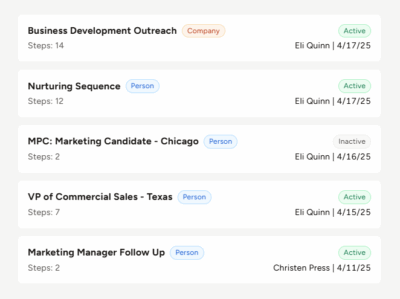In the world of agency recruiting and search consulting, maintaining strong, long-term relationships with clients, candidates, and colleagues is crucial for sustained success. While initiating these relationships is essential, the real challenge lies in keeping the momentum going.
Sustaining momentum requires ongoing effort, strategic planning, and a commitment to continuous improvement. This article from Top Echelon Recruiting Software explores effective strategies to keep relationships strong over time, ensuring that your agency remains a trusted partner in the eyes of clients and candidates alike.
The Importance of Sustaining Momentum
Building Trust and Loyalty
Strong, lasting relationships are built on trust and loyalty. By consistently delivering on promises, maintaining open communication, and providing exceptional service, recruiters can build a foundation of trust that encourages clients and candidates to return for future needs.
Enhancing Reputation and Brand Value
Sustaining momentum in relationships helps enhance your agency’s reputation and brand value. Clients and candidates who have positive, ongoing experiences with your agency are more likely to refer others and provide positive reviews, strengthening your market position.
Driving Long-Term Business Growth
Long-term relationships drive business growth by ensuring a steady flow of repeat business and referrals. Maintaining strong relationships also allows for deeper understanding of client and candidate needs, leading to more successful placements and satisfied stakeholders.
Strategies for Sustaining Momentum
1. Regular and Meaningful Communication
Consistent, meaningful communication is the cornerstone of sustained relationships. Regular check-ins, updates, and feedback sessions help keep the lines of communication open and demonstrate your commitment to the relationship.
Tips for Effective Communication
- Scheduled Check-Ins: Establish regular check-in meetings with clients and candidates to discuss progress, address concerns, and gather feedback.
- Personalized Messages: Tailor your communication to the individual needs and preferences of each client and candidate. Personalization shows that you value their unique perspectives and needs.
- Transparency: Be transparent about any challenges or changes in the recruitment process. Honest communication builds trust and fosters a collaborative approach to problem-solving.
- Active Listening: Practice active listening by fully engaging with what the other person is saying, acknowledging their points, and responding thoughtfully.
2. Delivering Consistent Quality
Consistency in the quality of service you provide is crucial for maintaining strong relationships. Clients and candidates need to know they can rely on you to deliver exceptional results every time.
Tips for Consistent Quality
- Standardized Processes: Implement standardized processes for key aspects of your recruitment services to ensure consistency in delivery.
- Quality Control: Establish quality control measures to regularly review and improve your services. This can include client and candidate satisfaction surveys, performance metrics, and regular team reviews.
- Continuous Improvement: Foster a culture of continuous improvement within your team. Encourage feedback, invest in training, and stay updated on industry best practices.
- Attention to Detail: Pay attention to the details that matter to your clients and candidates. Personalized touches and attention to their specific needs can make a significant difference.
3. Providing Value Beyond Placements
Building strong, lasting relationships requires providing value beyond just filling positions. Offering additional support and resources demonstrates your commitment to the success of your clients and candidates.
Tips for Providing Additional Value
- Industry Insights: Share industry insights, market trends, and valuable information that can help clients and candidates make informed decisions.
- Career Development: Offer career development resources and advice to candidates, such as resume reviews, interview preparation, and career coaching.
- Consultative Approach: Take a consultative approach with clients, offering strategic advice on workforce planning, talent management, and organizational development.
- Aftercare Services: Provide aftercare services, such as follow-up calls and check-ins, to ensure successful integration of placed candidates and ongoing client satisfaction.
4. Building a Strong Network
A strong professional network is a valuable asset for sustaining momentum in relationships. Building and nurturing a network of industry contacts, former clients, and candidates can lead to new opportunities and referrals.
Tips for Building a Strong Network
- Networking Events: Attend industry conferences, seminars, and networking events to connect with potential clients and candidates.
- Social Media Engagement: Engage with your network on social media platforms like LinkedIn. Share valuable content, participate in discussions, and connect with industry professionals.
- Alumni Networks: Stay in touch with former clients and placed candidates. Alumni networks can be a source of referrals and repeat business.
- Partnerships: Form partnerships with complementary businesses and organizations to expand your network and create mutually beneficial opportunities.
5. Leveraging Technology
Technology can enhance your efforts to sustain relationships by streamlining communication, improving efficiency, and providing valuable insights.
Tips for Leveraging Technology
- Customer Relationship Management (CRM) Systems: Use CRM systems to manage client and candidate relationships. CRM tools can help track interactions, manage follow-ups, and provide insights into relationship health.
- Automated Communication: Implement automated communication tools for routine updates and reminders. Automation ensures consistency and frees up time for more personalized interactions.
- Data Analytics: Use data analytics to track key metrics such as client and candidate satisfaction, placement success rates, and engagement levels. Data-driven insights can guide your relationship management strategies.
- Virtual Collaboration Tools: Use virtual collaboration tools like video conferencing, chat platforms, and project management software to facilitate seamless communication and collaboration.
6. Demonstrating Appreciation
Showing appreciation for your clients and candidates can go a long way in strengthening relationships. Simple gestures of gratitude can reinforce your commitment to their success and build lasting goodwill.
Tips for Demonstrating Appreciation
- Personalized Thank-Yous: Send personalized thank-you notes or emails to clients and candidates to express your gratitude for their partnership.
- Recognition Programs: Implement recognition programs to celebrate milestones and achievements, such as anniversaries of successful placements or long-term client partnerships.
- Gifts and Tokens of Appreciation: Occasionally send thoughtful gifts or tokens of appreciation to show that you value the relationship. This could include holiday gifts, birthday cards, or small tokens of appreciation.
- Client and Candidate Events: Host events, such as appreciation dinners or networking events, to bring clients and candidates together and celebrate your partnerships.
7. Adapting to Change
Flexibility and adaptability are essential for sustaining momentum in relationships. The ability to respond to changing client needs, market conditions, and industry trends demonstrates your commitment to staying relevant and responsive.
Tips for Adapting to Change
- Stay Informed: Keep abreast of industry trends, market changes, and emerging technologies that may impact your clients and candidates.
- Solicit Feedback: Regularly solicit feedback from clients and candidates to understand their evolving needs and expectations. Use this feedback to adapt your services and strategies.
- Continuous Learning: Invest in continuous learning and professional development for yourself and your team. Staying updated on best practices and new methodologies ensures you can provide the best possible service.
- Agile Mindset: Cultivate an agile mindset within your team. Encourage flexibility, innovation, and a willingness to embrace change.
8. Investing in Relationships
Investing time and resources into building and maintaining relationships is essential for long-term success. Relationships should be viewed as long-term investments rather than short-term transactions.
Tips for Investing in Relationships
- Time Commitment: Dedicate time to regularly engage with clients and candidates, even when there are no immediate business needs.
- Resource Allocation: Allocate resources to relationship-building activities, such as client visits, networking events, and professional development opportunities.
- Long-Term Perspective: Adopt a long-term perspective in your relationship management strategies. Focus on building lasting partnerships rather than seeking immediate returns.
- Personal Touch: Incorporate personal touches in your interactions, such as remembering important dates, personal interests, and preferences.
Real-World Examples of Sustaining Momentum
Case Study 1: Building Long-Term Client Relationships
Scenario: A recruitment agency specializing in the tech industry aimed to maintain strong relationships with its key clients, ensuring repeat business and referrals.
Strategy:
- The agency implemented regular check-ins with clients, providing updates on market trends and candidate availability.
- They offered value-added services, such as workforce planning and talent management consulting, beyond their core recruitment services.
- The agency used CRM tools to track client interactions and preferences, ensuring personalized and consistent communication.
Outcome: The agency built strong, long-term relationships with its key clients, resulting in a steady flow of repeat business and high client satisfaction. Clients valued the agency’s proactive approach and commitment to their success.
Case Study 2: Enhancing Candidate Engagement
Scenario: A healthcare recruiting firm wanted to maintain strong relationships with placed candidates to ensure successful integration and future referrals.
Strategy:
- The firm established an aftercare program, conducting regular follow-up calls with placed candidates to address any concerns and gather feedback.
- They provided career development resources, such as continuing education opportunities and professional networking events, to support candidates’ long-term success.
- The firm used social media platforms to engage with candidates, sharing industry news, job search tips, and success stories.
Outcome: Placed candidates felt supported and valued, leading to high retention rates and positive word-of-mouth referrals. The firm built a strong alumni network that contributed to its reputation as a trusted career partner.
Case Study 3: Leveraging Technology for Relationship Management
Scenario: A finance recruitment agency wanted to enhance its relationship management efforts using technology.
Strategy:
- The agency implemented a CRM system to manage client and candidate interactions, track engagement metrics, and automate routine communications.
- They used data analytics to identify trends and insights, such as client satisfaction levels and candidate placement success rates.
- The agency adopted virtual collaboration tools to facilitate seamless communication with remote clients and candidates.
Outcome: The agency improved its efficiency and effectiveness in managing relationships, resulting in higher client and candidate satisfaction. The use of technology allowed them to provide personalized and responsive service, strengthening their market position.
Keep the Momentum Going
Sustaining momentum and keeping relationships strong over time is essential for long-term success in the recruitment industry. By prioritizing regular and meaningful communication, delivering consistent quality, providing value beyond placements, building a strong network, leveraging technology, demonstrating appreciation, adapting to change, and investing in relationships, agency recruiters and search consultants can build and maintain strong, lasting partnerships.
These strategies not only enhance client and candidate satisfaction but also drive business growth and reinforce your agency’s reputation as a trusted partner. By embracing a proactive and strategic approach to relationship management, you can ensure that your agency remains at the forefront of the industry, delivering exceptional value and achieving sustained success.








